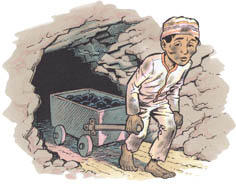Reference Texts
Proposed Actions

Return to Reference Texts
Not only is child labour often dangerous, but exploitative conditions are a violation of the Convention on the Rights of the Child. For the sake of children all possible measures should be taken to eliminate these practices. Work opportunities for adults must also be expanded to help those families who depend upon the salaries of their children.
The causes of child labour are complex and include factors such as poverty, economic exploitation, and the cultural environment. To resolve the problem, a variety of measures and partner organizations are needed.
A few actions to be taken, according to UNICEF, include the following:

- Eliminate child labour in dangerous and exploitive conditions. Dangerous and exploitative child labour should not be tolerated, especially servitude, sexual exploitation, and any labour that prevents the physical, social, cognitive, emotional, or moral development of the child. National authorities must take action to end these practices.
- Establish mandatory and free primary education. Nations must make primary education free and mandatory according to Article 28 of the convention, and ensure that all children attend school full-time until the end of primary school. They must reserve the necessary funds in existing budgets or from development aid.
- Enhance legal protection. Laws regarding child labour and education must be coherent and mutually supported. National laws must cohere with the Convention on the Rights of the Child as well as the policies of the International Labour Office. These laws must also apply to the often unstructured work on streets, on farms, in homes, and in other areas of domestic work.
- Register all births. All children must be registered upon birth according to Article 7 of the Convention in order to have access to their rights such as education and health care. This action is also necessary so that employers and inspectors can verify the age of workers.
- Collect data and maintain a continual surveillance. Data about child labour is rare; national and international systems must be established to overcome the obstacle and to assemble data and statistics for comparison and progress indicators. Data is especially needed for “invisible” zones including domestic work and servitude. The involvement of local communities and the youth themselves is also important for improving their situation.
- Adopt management rules and create purchasing policies.National and international societies must immediately adopt laws to guarantee that neither them nor their sub-contractors employ children in a manner that is likely to violate their rights. Adjusting purchasing policies to keep in mind the interests of children would also be ideal.
Translated from Source: http://www.unicef.org/french/sowc97/ending.htm

|